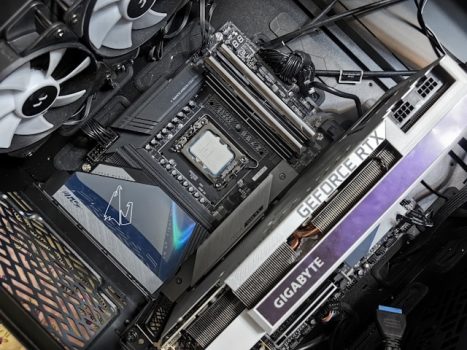 Pin
Pin Image from Unsplash
In a decisive move to maintain its technological supremacy, the United States has intensified its restrictions on the global distribution of artificial intelligence (AI) chips. This strategic initiative, unveiled on January 13, 2025, aims to curtail the access of nations such as China, Russia, Iran, and North Korea to advanced AI technologies, thereby safeguarding national security and preserving the competitive edge of American innovation.
Table of Contents
A New Era of Technological Containment
The freshly introduced regulations categorize countries into three distinct tiers:
- Unlimited Access: Key allies, including Japan and the United Kingdom, retain unrestricted access to AI chips, reflecting deep-seated trust and collaborative technological development.
- Capped Exports: A broad spectrum of nations faces limitations on the volume and sophistication of AI chips they can procure, a measure designed to prevent the diffusion of cutting-edge technology that could potentially be repurposed for adversarial uses.
- Complete Embargo: Countries under arms embargoes, notably China, Russia, Iran, and North Korea, are entirely barred from acquiring advanced AI chips, a decisive action to impede their military and surveillance capabilities.
These measures are a continuation of the U.S. strategy to restrict China’s access to advanced chip technology, aiming to prevent the enhancement of its military capabilities.
Industry Response
The semiconductor industry has responded with a mixture of apprehension and criticism. Nvidia, a leading AI chip manufacturer, has been particularly vocal, arguing that the restrictions could inadvertently stifle global innovation and undermine U.S. competitiveness. The company contends that such regulatory overreach may benefit foreign competitors, especially those in China, by creating opportunities in markets now restricted to American firms.
Similarly, Oracle has expressed concerns that the new rules could disrupt the global chip market, potentially leading to unintended economic consequences.
Geopolitical Implications
The timing of these regulations is particularly noteworthy, coinciding with the transition between presidential administrations. The Biden administration’s last-minute implementation of these rules places the onus on the incoming Trump administration to decide their future. Given President Trump’s previous emphasis on deregulation to spur AI innovation, there is speculation that these measures may be reassessed or even repealed.
Global AI Landscape
The U.S. government’s actions underscore a broader strategic imperative to maintain leadership in AI technology. By restricting the flow of advanced AI chips, the U.S. aims to impede rival nations from developing capabilities that could challenge its technological and military dominance. This approach reflects a calculated effort to control the diffusion of AI technologies that have far-reaching implications for global power dynamics.
Economic Ramifications
The economic implications of these export controls are multifaceted. On one hand, they aim to protect U.S. industries from foreign competition and intellectual property theft. On the other hand, they risk isolating American companies from lucrative international markets. The Semiconductor Industry Association has criticized the timing of these measures, especially during a presidential transition, suggesting that such abrupt policy shifts could disrupt global supply chains and economic stability.
Technological Decoupling
The move towards technological decoupling from China signifies a significant shift in global trade relations. By severing ties in the AI sector, the U.S. risks triggering a bifurcation of technological ecosystems, leading to incompatible standards and hindering international collaboration. This decoupling could slow the pace of global innovation, as researchers and companies navigate a more fragmented technological landscape.
National Security vs. Economic Interests
The crux of the debate lies in balancing national security concerns with economic interests. While the U.S. government argues that restricting AI chip exports is essential to prevent adversaries from enhancing their military capabilities, industry leaders warn that such measures could backfire economically. Nvidia’s criticism highlights fears that overregulation may stifle the very innovation the U.S. seeks to protect, potentially ceding ground to foreign competitors.
International Relations
The export controls have elicited varied reactions from the international community. Allied nations with unrestricted access may view this as a reaffirmation of their strategic partnerships with the U.S. Conversely, countries facing capped exports or complete embargoes may seek to strengthen alliances elsewhere, potentially turning to nations like China for technological collaboration. This realignment could alter geopolitical alliances and economic partnerships in unforeseen ways.
Technological Sovereignty
In response to U.S. export controls, affected nations may accelerate efforts to achieve technological sovereignty. China, for instance, has been investing heavily in its semiconductor industry to reduce reliance on foreign technology. The U.S. measures may serve as a catalyst for such initiatives, prompting a surge in domestic innovation and the development of indigenous technologies in these countries.
Ethical Considerations
The ethical implications of restricting access to AI technology are complex. While the intent is to prevent the misuse of AI in military and surveillance applications, these measures also limit the potential benefits of AI in fields like healthcare, education, and environmental management in the affected countries. The challenge lies in crafting policies that mitigate risks without hindering positive technological advancements.
Moreover, such restrictions may exacerbate global inequalities by hindering the development of AI capabilities in less technologically advanced nations. This could lead to a scenario where only a select group of countries reap the benefits of AI advancements, leaving others at a significant disadvantage. The ethical dilemma, therefore, revolves around balancing national security concerns with the moral obligation to promote global technological progress and equity.
In this context, international cooperation and the establishment of global ethical standards for AI development and deployment become crucial. By working together, nations can address security concerns while ensuring that the benefits of AI are accessible to all, fostering a more equitable and just global society.































